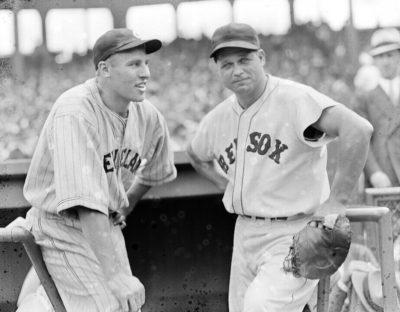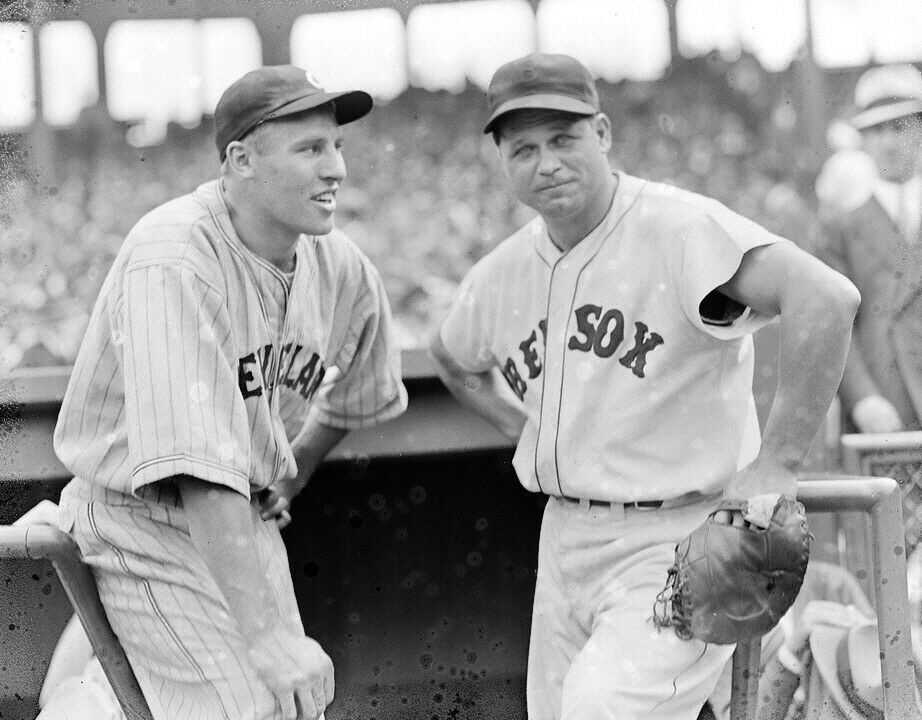Subscribe to Baseball History Comes Alive! for automatic updates (sign-up block found in right side-bar)
As a Free Bonus for subscribing, you’ll get instant access to my two Special Reports: Memorable World Series Moments and Gary’s Handy Dandy World Series Reference Guide!
Hal Trosky Photo Gallery
Click on any image below to see photos in full size and to start Photo Gallery:

The Indians’ Hal Trosky: The Best Player Who Was Never An All-Star!
Talk about being in the wrong place at the wrong time! I think we can all feel for Hal Trosky. If your All-Star competition at first base was Lou Gehrig, Jimmie Foxx, and Hank Greenberg, I’d say your chances of making the All-Star team would probably not be very good!
We’ll continue today with our on-going, off-season look at forgotten stars, as we shine our baseball spotlight on the often-overlooked slugger from the 1930s, Hal Trosky.
Signed off the sandlots of his native Norway, Iowa by legendary Indian scout Cy Slapnicka, Hal Trosky was once hailed as “the next Babe Ruth.” We can all agree that’s pretty strong hype, but Hal was a sensation, a “phe-nom” to use baseball lingo, and at the start of his career, it looked like he would live up to the promise.
Tragically, his power numbers declined and his career was cut short as he became saddled with debilitating migraine headaches. The affliction started at age 25 and plagued him for the remainder of his playing days. At times the pain and pounding in his head was so severe, as anyone who has experienced migraines can attest, that he was unable to take the field for days at a time. Trosky may never have been an All-Star, but had the migraines not shortened his career, he might well have made it to the Hall of Fame, as you’ll soon see.
In the featured photo above, we see Hal Trosky on the left with the great Hall-of-Famer, Jimmie Foxx (from the Leslie Jones Boston Public Library collection).
After signing with the Indians, Hal spent two impressive years in the minors which included stops with such notable teams as the Cedar Rapids Bunnies and the Toledo Mud Hens. He was a September 1933 call-up and made his major league debut with the Indians on September 11 at age 21. It soon became apparent to all that Hal Trosky was the “real deal.”
Trosky played 11 seasons in the “Big Show” for the Indians (1933-’41), and White Sox (1944, 1946). Over his career, the 6’2” 207-pound slugger batted .302, with 1561 hits, 228 home runs, 1012 RBIs, a .371 on-base percentage, and a .522 slugging average. His OPS+ rating of 130 places him well above his major league contemporaries (100 being the major league average). During his first three seasons, he amassed more RBIs than either Lou Gehrig, Jimmie Foxx, or Hank Greenberg during their first three years.
Over his career, Trosky finished in the Top-10 in both home runs and slugging average six times. From 1934-’39, he drove in over 100 RBIs in each of the six seasons. He received MVP votes in four different seasons. His 216 home runs with the Indians rank him fifth on their all-time list. He also hit three home runs in one game twice.
Check out his performance in 1936, his best season. Hal must have been asking himself, “What else does a guy have to do to make the All-Star team?” That year all he did is hit .343, with 42 home runs (setting a new Indians’ team record, breaking the previous record held by himself), 216 hits, 45 doubles, a .382 on-base percentage, and a “Ruthian” .644 slugging average. Plus he led the league in RBIs (162), setting a team record that stood for 62 years. He also led the league in extra-base hits (96), and total bases (405), setting a mark that remains the Indians’ team record to this day. Throw in a 28-game hitting streak, and I’d say Hal had a pretty impressive year. But no, not even those numbers could land him a spot on the 1936 All-Star team, the honor that year going to Lou Gehrig.
Starting in 1936, at what should have been the peak of his career, Hal began experiencing debilitating migraines. The headaches affected his vision, making it difficult to pick up major league fastballs. Often taking himself out of the lineup, by 1939, he had only 448 plate appearances in 122 games, marking the first season he failed to play in at least 150 games.
In 1940, Trosky was named the team captain. He probably regretted accepting the honorary position and the $500 stipend that came with it. He became embroiled in the infamous “Cry-Baby Incident,” as Indian players staged what was later called an “insurrection” against their acerbic, unpopular manager, Ossie Vitt. Eleven veteran Indians’ players sought a meeting with owner Alva Bradley to complain about Vitt, stating that they could not win the 1940 pennant with Vitt as the manager.
Trosky was unable to attend the meeting due to the death of his mother, but phoned Bradley, wanting to show support for his teammates. Sportswriter Gordon Cobbledick of the Cleveland Plain Dealer found out about the meeting and ran with it. The “insurrection” was big news in Cleveland the next morning. According to Trosky’s SABR biography, “The headline for the story was physically larger on the printed page than that afforded to Hitler’s invasion of Paris.” Trosky, as team captain, became the face of the “Cry-Baby Incident” and saw his reputation in baseball circles sullied because of it.
By 1941 the migraines were increasing and often leaving him in agony. He was playing less and less. After nearly being hit by a pitch, he announced in July, “A fellow can’t go on like this forever. If I can’t find some relief, I’ll simply have to give up and spend the rest of my days on my farm in Iowa.”
He finished the year with only 310 at-bats and his career in Cleveland was over. He was out of baseball for the1942 and ’43 seasons, back at his Iowa farm. He returned for the 1944 and 1946 seasons with the White Sox, but he knew it was now time to hang up the spikes. After his playing career ended, he served as a scout for the White Sox and later managed in semi-pro leagues in Iowa.
In 1950, he left baseball for good to tend to his Iowa farm. He later sold agricultural real estate in Cedar Rapids. In retirement, he enjoyed hunting, fishing, playing cards, and was active in his church. He kept contact with baseball through his participation in the Iowa High School Baseball Coaches Association. He also devoted much of his time to his family and raising his four children. His son, Hal Trosky, Jr., made it briefly to the majors as a pitcher for the White Sox in 1958.
Hal Trosky passed away in 1979 at his Cedar Rapids apartment after suffering a massive heart attack. He was 66 years old.
Never a major league all-star, Hal Trosky has been enshrined in the Cleveland Indians Hall of Fame. Let’s take a moment to salute a fine ballplayer, Hal Trosky, whose career at first base was overshadowed by some pretty good names: Gehrig, Foxx, and Greenberg.
Shop MLB.com. The Official Online Shop of Major League Baseball.
Gary Livacari
Photo Credits: All from Google search
Information: Excerpts and quotes edited from the Hal Trosky SABR biography by Bill Johnson; and from the Hal Trosky Wikipedia page.
Check out my latest books both now available on Amazon in e-book and paperback, Reflections On the 1919 Black Sox: Time to Take Another Look. All profits go to the Illinois Veterans Foundation.
We are a participant in the Amazon Services LLC Associates Program, an affiliate advertising program designed to provide a means for us to earn fees by linking to Amazon.com and affiliated sites. Click here to view Amazon’s privacy policy

